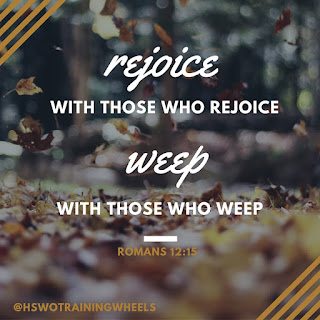First, I've been having fun over on my blog's facebook page (www.facebook.com/hswotrainingwheels) producing daily under-five-minute thoughs for mamas. If you click on over there, "like" the page and then turn on notifications, you should see them pop up in your news feed (most) every day Monday through Friday. As I say in the videos, I try to do them every morning, where "morning" is defined loosely as "before lunch".
The other bit of news, the news that has me almost giddy with excitement, is that we are about to move! No, not houses. Blog locations!! Coming soon (very, very soon!) you can find me over at www.hswotrainingwheels.com!! If you click on that link now you'll just get an ugly screen that says the blog is "coming soon" so here's a sneak peek at part of the new design and color scheme:
Don't worry - all of the content from this blog has been imported over there. Some of the posts are "live" now and some I'll roll out a little at a time going forward. Everything is in place; I just need a little more time to work on the "window dressing" and we'll be open for business! If you are reading this post in e-mail, your address has already been uploaded for inclusion in the new blog's e-mail list. (The first time you visit the new blog you will probably be prompted to give your e-mail address. Go ahead and put it in. You won't receive duplicate e-mails, but the blog will stop bothering you about it.)
I'm planning some fun "grand opening" events. I'll keep you posted as I get closer to "go time"! Would you please pray that I will make wise choices about managing this new space? The moment one purchases a domain name, one is inundated with plugs from all kinds of services to "grow your subscriber list!" and "increase traffic!". I'll be honest; I do want people to see the blog. I do want the work that I put into writing and designing posts to be of benefit to people. I do need to put some effort (and perhaps some money) into letting folks know that there is something available.
But I also know that numbers are not the clearest measure of whether or not the blog is a blessing to others. And I'm not really interested in numbers showing up at my blog. I want people (mostly moms or parents) who can be encouraged or inspired to think about things from a different angle. It's not a popularity contest. But it is a marketplace of ideas in which one needs to put out a shingle in order for folks to know that there might be interesting stuff happening inside.
Big adventures ahead. And big challenges, too, I'm sure. The support of those who have followed me here is more precious than I can say!
















